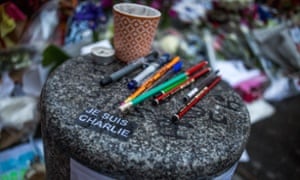British Weaponized Ignorance in Ireland, since the signing of the Pseudo Peace Processs twenty years ago, without a Truth & Reconciliation element, is now almost complete, with the internment of the Chairperson of The Irish Anti-Internment League, Dee Fennell earlier this week. This current reality in Ireland, with the possible exception of Social Media and just a couple of journalists, being the exception, in the Irish mainstream media. The threat of political internment, assassination, coupled with self-censorship, has sucessfully, hidden the harsh reality of Ireland, from the World. Coupled with a ruling undemocratic Junta, of the bestial Orange Order and pedophile Sinn Fein, the absence of a dialectic, guarantees an explosion of violence, that will make the troubles of the last 45 years, comparatively, seem like a storm in a tea cup. The article below from the British Guardian, demontrates this clearly.
Belfast ‘shamed’ after university cancels Charlie Hebdo conference
Northern Irish author Robert McLiam Wilson criticises Queen’s University Belfast after it calls off discussion of the killings in Paris for security reasons

An award-winning novelist has said he is ashamed of his native city because of the decision by Queen’s University Belfast to cancel an academic conference on the Charlie Hebdo massacre for security reasons.
Robert McLiam Wilson, the Paris-based author of Ripley Bogle and Eureka Street, described the cancellation of the event in the face of an unspecified security threat as “not cowardice or surrender. It is part of a long defeat in an unfought war.”
McLiam Wilson, who writes for the French satirical magazine, said he could not believe that a city like Belfast that had endured decades of violence would call off the conference.
Speaking from his home in Paris, the author, who was born in west Belfast, said: “I am feeling a touch of shame today. Cancelling such an event in the face of putative menace in a city that endured a 30-year torture of self-immolation seems worse than pusillanimous. Belfast? Seriously? This is not the city I remember. This cancellation says, with trumpeting clarity, that there is no debate because there can be no debate. There is a big boat that can’t be rocked.”
He added: “Charlie Hebdo is anti plenty of things. But it is not anti-Arab or anti-Israeli or anti-immigrant. No one gets more grief than Front National leader Marine Le Pen and loopy rightwinger Nicolas Sarkozy. If you speak French, it’s pretty hard to deny what Charlie really is. It is, monotonously, rigorously and sometimes unamusingly anti-arsehole. I am beyond proud to write for Charlie. And not, today, so proud of the city of my birth.”
The novelist has been living in Paris for more than a decade and has written three books in English. Eureka Street was adapted for BBC television in 1999 and is partly set in the Holylands district close to Queen’s University. McLiam Wilson has also written a television documentary on paramilitary punishment attacks in Belfast and recently recorded an essay for Radio 4 about his love for Paris in the aftermath of the attack by two gunmen on the Charlie Hebdo offices in January, in which 12 people were killed.
A conference to discuss the implications of the attack on the magazine involving academics, novelists, journalists and commentators was due to take place at the Queen’s University institute for collaborative research in the humanities in June.
The institute claimed that the university’s vice-chancellor, Patrick Johnston, had cancelled the event because of the security risk and concerns for the university’s reputation.
An email circulated by the institute this week said: “The vice-chancellor at Queen’s University Belfast has made the decision just this morning that he does not wish our symposium to go ahead.
“He is concerned about the security risk for delegates and about the reputation of the university.”
On Wednesday, Queen’s University denied that the cancellation of the conference had anything to do with academic freedom.
A spokesperson said: “As part of managing the health and safety of the institution it is a requirement for all major events to have a full risk assessment completed prior to them going ahead on the campus. Unfortunately, the proposed symposium organised by the institute for collaborative research in the humanities did not have a completed risk assessment and as a result the institute has cancelled the event.
“This issue is not related to academic freedom and Queen’s continues to uphold the importance of academic freedom in a world-class institution and has demonstrated this over many years.”
However, locally based writers have joined McLiam Wilson in condemning the cancellation.
The Irish poet and playwright Damian Gorman, who has taught at Queen’s University, said: “While I’d like to, I don’t believe in the absolute freedom to do or say whatever you want to wherever you want. I wouldn’t, for example, defend someone’s right to light up in an oil refinery – literally or metaphorically.
“But, in saying that, I just don’t understand why Queen’s won’t have a conference looking at the Charlie Hebdo attacks in the round. Is that not the sort of thing universities are for?”
The award-winning Belfast-based Irish blogger Alan Meban accused the university of being influenced by commercial considerations.
“QUB has outposts internationally and perhaps there are fears for the security of staff and students. However, QUB’s reference to ‘reputation’ in their cancellation implies a worry about their ability to attract funding from overseas investors, particularly international students who pay premium fees.
“We need our universities to stand up for learning, reflection and free speech, rather than being bound up by bursars and budgets,” said the author of the Alan in Belfast blog.


No comments:
Post a Comment